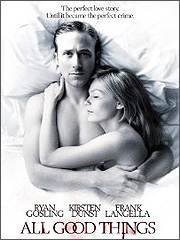
This past weekend I saw All Good Things, a 2010 film starring Ryan Gosling and Kirsten Dunst.
I caught both the abortion and its aftermath loud and clear. I wonder if all viewers noticed it and made the connection between the abortion and the destruction of the relationship…
Do You Want to Have Kids?
Gosling plays David Marks, a young man whose pushy father is very wealthy and rather sketchy. Dunst plays Katie, a lower/middle class girl who falls for David. They spend several years very happily married (although things aren’t quite as good once David gets pulled into the family business as they had been before).
After being married for a couple of years, Katie finally asks David whether he wants to have children. He answers, “No.” She asks, “Not now, or not ever?” And poor Katie is devastated to discover that he doesn’t ever want to have kids.
At which point I shouted at the TV, “Shouldn’t you have had this discussion before getting married?!”
Sadly, this scene is merely a reflection of real life. There are people who really don’t have these discussions before they marry, and that’s just sad. (Refusing to have children after getting married is also sad…)
The Abortion Begins the Destruction of the Relationship
Well, naturally Katie gets pregnant. And, naturally, David is ticked off.
So they hop in a cab to go to “an appointment.” The movie is set in New York in the early 1970’s, so those of us who know about abortion laws know that abortion was already legal in New York then.
It’s not until much later that Katie even says the word abortion. But you know that’s what happened because her relationship with David is destroyed. She begins doing drugs. They begin living separate lives. They don’t talk. She moves out of the house (ostensibly to be closer to her college).
Finally she tells a friend, “My father always said to only regret the things you didn’t do, not the things you did. But I had an abortion and I don’t know if that’s something I did or didn’t do.” I think it’s both. Having an abortion is something she did to end her baby’s life. But it’s also something she didn’t do: she didn’t ever get to be a mother to her baby.
Based on Real Events
This is not a happy movie. It’s all the more depressing because it’s based on the true story of the life and disappearance of Kathleen Durst.
The script was written by Marcus Hinchey and Marc Smerling; it’s the first script for both of them. This script is their way of making all the events related to Durst’s disappearance fit together—in a way that will make money in the box office, of course.
The media’s typical response to abortion is that it’s just another surgery, that it’s not a big deal. So writing the abortion as the starting point for the destruction of David and Katie’s relationship is an important recognition of the real impact abortion has on relationships.
I applaud Hinchey and Smerling for showing how harmful abortion can be.
